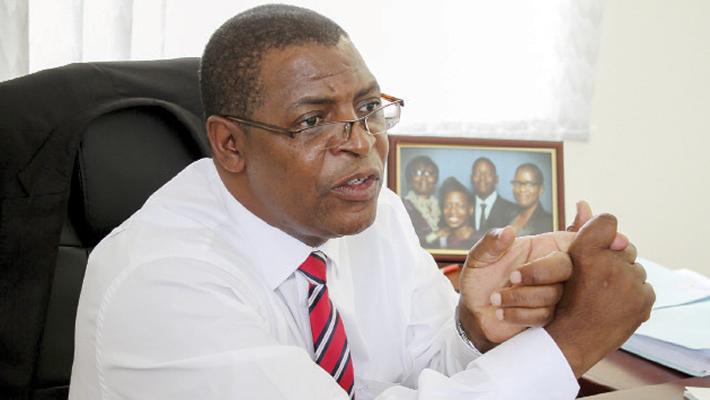News / National
Welshman Ncube apologises to Sengezo Tshabangu
5 hrs ago | Views

In a rare and humbling move for a senior legal practitioner, Professor Welshman Ncube, a law professor and prominent opposition figure, has issued a formal apology to the Harare High Court and Senator Sengezo Tshabangu, following a legal misstep in a recent court case that he now seeks to have reopened.
Prof Ncube's apology is contained in his 2,087-page urgent court application filed at the High Court for the rescission of a judgment in case HC 275/25. He argues that the ruling was a "default judgment", a claim not supported by the actual judgment, which makes no reference to any default.
In his court papers, Prof Ncube concedes that he made two elementary but costly mistakes in his handling of the case-errors that contributed to the unfavourable outcome for his party, the Citizens Coalition for Change (CCC). The application seeks to have the judgment set aside and the matter reopened to allow him a second chance to argue the case, this time correcting his own legal oversights.
However, unlike typical rescission applications, which allege a court error or miscarriage of justice, this one seeks to remedy mistakes of Prof Ncube's own making.
At the heart of the issue is Prof Ncube's now-invalidated opposing affidavit, which he filed on behalf of the CCC. The court, following legal arguments from both sides, found the affidavit to be legally defective, ultimately striking it out. This left Senator Tshabangu's application effectively unopposed, though not by default in the procedural sense.
The court's decision was made after hearing arguments and reviewing documents from both sides-contradicting Prof Ncube's characterization of the outcome as a "default judgment."
In a candid admission in paragraph 18 of his founding affidavit, Prof Ncube states:
"While careless, it was not deliberate and certainly did not indicate any disdain for the Rules of Court... I made an unfortunate error."
The apology is notable for a lawyer of Prof Ncube's standing-a professor of law and senior member of the bar-given the gravity and implications of his mistakes in such a high-profile matter.
The High Court had previously ruled that the legal defects in Ncube's affidavit rendered Tshabangu's case uncontested, thereby granting the latter relief sought against the CCC.
In the aftermath, Prof Ncube turned to social media platform X to confirm the filing of the rescission application and to inform his followers that a case management hearing is scheduled for this Wednesday at the Harare High Court.
Legal observers say the case will test the limits of judicial discretion when it comes to reopening cases not on grounds of judicial error, but on the basis of self-acknowledged legal blunders by an experienced attorney.
Prof Ncube's apology is contained in his 2,087-page urgent court application filed at the High Court for the rescission of a judgment in case HC 275/25. He argues that the ruling was a "default judgment", a claim not supported by the actual judgment, which makes no reference to any default.
In his court papers, Prof Ncube concedes that he made two elementary but costly mistakes in his handling of the case-errors that contributed to the unfavourable outcome for his party, the Citizens Coalition for Change (CCC). The application seeks to have the judgment set aside and the matter reopened to allow him a second chance to argue the case, this time correcting his own legal oversights.
However, unlike typical rescission applications, which allege a court error or miscarriage of justice, this one seeks to remedy mistakes of Prof Ncube's own making.
At the heart of the issue is Prof Ncube's now-invalidated opposing affidavit, which he filed on behalf of the CCC. The court, following legal arguments from both sides, found the affidavit to be legally defective, ultimately striking it out. This left Senator Tshabangu's application effectively unopposed, though not by default in the procedural sense.
The court's decision was made after hearing arguments and reviewing documents from both sides-contradicting Prof Ncube's characterization of the outcome as a "default judgment."
In a candid admission in paragraph 18 of his founding affidavit, Prof Ncube states:
"While careless, it was not deliberate and certainly did not indicate any disdain for the Rules of Court... I made an unfortunate error."
The apology is notable for a lawyer of Prof Ncube's standing-a professor of law and senior member of the bar-given the gravity and implications of his mistakes in such a high-profile matter.
The High Court had previously ruled that the legal defects in Ncube's affidavit rendered Tshabangu's case uncontested, thereby granting the latter relief sought against the CCC.
In the aftermath, Prof Ncube turned to social media platform X to confirm the filing of the rescission application and to inform his followers that a case management hearing is scheduled for this Wednesday at the Harare High Court.
Legal observers say the case will test the limits of judicial discretion when it comes to reopening cases not on grounds of judicial error, but on the basis of self-acknowledged legal blunders by an experienced attorney.
Source - online
































